Thanks to National Lottery Heritage Fund, Birmingham and Black Country Wildlife Trust were able to create this innovative programme to help prepare people for a career in the environmental sector. The traineeship targeted local people over the age of 18 and, most importantly, those with a passion for the wild world and making a difference in their community!
Natural Prospects: Training the conservationists of the future
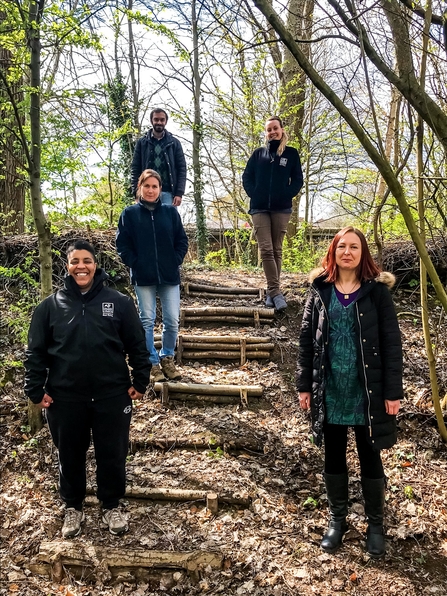
Birmingham & Black Country Wildlife Trust
Natural Prospects is all about giving people the skills and confidence they need to start a career in conservation. The traineeship actively challenges the barriers people face in accessing careers in the environmental conservation sector by providing trainees with the chance to get hands-on, practical experience. Former trainee, Jane Grove says “The wonderful thing about this job is that the learning will never stop; discovering how to identify plants, how to survey a meadow, to help manage habitats, detect bats, to build a bridge over a brook or how to fell a tree or engage a group of school children (to name but a fraction of what I’ve learned so far), has been a fantastic journey.” As well as this, trainees also worked to achieve a City and Guilds Level 2 Work Based Certificate in Environmental Conservation.
I do not feel as though I am exaggerating when I say that in this past year I feel I have changed as a person. I have transformed from a shy, reserved character to a leader!Former Natural Prospects Trainee
However, this programme isn’t just about improving the practical skills of the trainees. Spending time outdoors and connecting with nature has a whole host of benefits, like improving self-confidence. And that’s exactly what the Natural Prospects trainees have found! Former trainee Aneesha Davies said “I do not feel as though I am exaggerating when I say that in this past year I feel I have changed as a person. I have transformed from a shy, reserved character to a leader! I can now confidently lead groups and passionately engage with members of the public; and it is this aspect of the traineeship that I have enjoyed the most.”
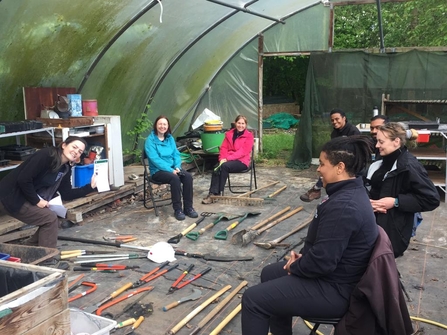
Birmingham & Black Country Wildlife Trust
It's no secret that more diversity is needed in the world of conservation, and that is something that this programme has been tackling. Over four years the programme has welcomed people with diverse backgrounds, ages, cultures and experiences from those taking the first steps in the world of work to individuals making a complete career change. Although passion is important, people still need the means to take part in any kind of work experience. The traineeship offered each participant a £9,000 bursary to give more people the chance to take part, leading to a more diverse workforce in the environmental sector!
It had been a while since I’d worked with young people and working with this group made me feel really hopeful about the futureFormer Natural Prospects Trainee
The trainees had the opportunity to interact with a wide variety of people, which has had huge positive impacts on their overall experience. Former trainee, Gayle Webster says “It had been a while since I’d worked with young people and working with this group made me feel really hopeful about the future, they had a real interest in wildlife, taking care of the environment and worked so well as a team supporting each other.”
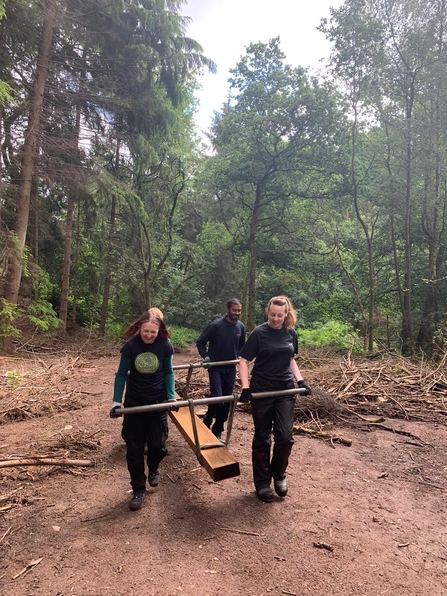
Birmingham City Council Park Ranger Team (based at Lickey Hills Country Park)
Now in its final year, Natural Prospects has been a roaring success! Since it began in 2019, all 13 trainees who have completed the programme so far have secured employment or are continuing with further education. Amazingly, 90% are working within the environmental sector and two have secured jobs at the Trust. The six trainees approaching the end of their traineeship are already showing signs of success; two have already been offered employment! Birmingham and Black Country Wildlife Trust are now looking for funding opportunities to continue to this successful programme into the future.
Take a look at what other trainees had to say about taking part in the programme
Aneesha Davies - Love Your River Cole (LYRiC) Trainee
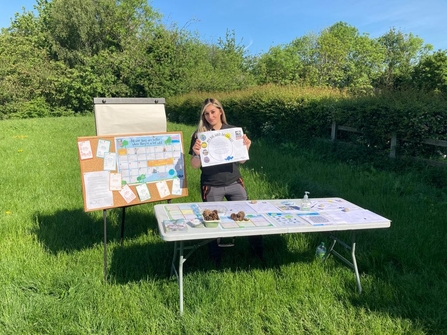
Birmingham & Black Country Wildlife Trust
Upon hearing about the traineeship, and attending a taster session at The Wildlife Trust for Birmingham and The Black Country’s EcoPark site I couldn’t get it out of my head. The prospect of working alongside a respected wildlife conservation organisation, in addition to the monthly bursary and a training budget seemed almost ‘too good to be true’.
Prior to the traineeship, I had been in full-time education, working towards a master’s degree in ‘Conservation Biology’. Despite this, I felt wholly unprepared and inexperienced to enter the competitive sector as I had very little practical experience and my theoretical knowledge had never been applied. Being a young single parent, the extensive volunteering that would be required was not a realistic option for me and I was feeling pressured to put my goals on hold in order to gain employment outside of the sector. The traineeship was my golden opportunity- It provided me with a form of income to ‘get by’, as I got the practical experience I desperately needed.
I do not feel as though I am exaggerating when I say that in this past year I feel I have changed as a person. I have transformed from a shy, reserved character to a leader! I can now confidently lead groups and passionately engage with members of the public, and it is this aspect of the traineeship that I have enjoyed the most. I have had the opportunity to co-lead level one ‘tool use’ courses and I have witnessed first-hand the way in which these initiatives can enhance people’s lives. I have also had the opportunity to get involved in various construction tasks, habitat management and my wildlife identification skills have improved massively. The brilliant part about the traineeship is the ability to gain a huge variety of different experiences which has allowed me to pinpoint the aspects I am most passionate about- and would not be possible in any other circumstances. I have already begun to apply these new skills outside of the traineeship- co-leading a volunteer group in my local area with the council Parks Ranger which would have not been possible before.
Staff within the trust have been incredibly supportive throughout and keen to impart their particular knowledge and expertise. In particular Jen my assessor has been a great support in guiding me with the portfolio work and Niel my line manager has been a fantastic mentor, putting me at ease when approaching new tasks and continually presenting me with new challenges to overcome.
I now feel completely confident that I can gain employment within the sector once the traineeship is over and I look forward to what the future holds! I’d love to go into a community engagement/ environmental education role with The Wildlife Trust or a similar organisation eventually which I now feel is in reach.
Jane Grove: Natural Prospects Cohort 3: 2021-2022
Birmingham & Black Country Wildlife Trust
I’ve worked in some very varied roles over the years and whilst I have loved some of the jobs I’ve been lucky enough to do, I always felt I wasn’t where I wanted to be. Getting a foot on the ladder in the conservation sector can be challenging; working two jobs left no time to commit to a regular volunteer group and I wasn’t in a position to go to University. As soon as I saw this traineeship advertised in 2019 I knew it was the opportunity I was looking for. I wasn’t successful that time, but when I saw the next round of recruitment advertised – between lockdowns in a global pandemic! – I had to go for it. I was fortunate enough to be chosen as the trainee working with the Education and Engagement team and I haven’t looked back. Changing career can feel like a risk, but the whole experience has been more than I could have expected.
During this traineeship, I have been able to learn a broad range of practical and theory skills, the wealth of knowledge within the different departments at the Trust and within the Ranger Teams at some of the other placements is massive. I learn multiple new things every day. My baseline knowledge was minimal when I started this placement, so I’ve tried to absorb as much detail as possible from my colleagues, the volunteers we work with, the other trainees and our external training providers. The wonderful thing about this job is that the learning will never stop; discovering how to identify plants, how to survey a meadow, to help manage habitats, detect bats, to build a bridge over a brook or how to fell a tree or engage a group of school children (to name but a fraction of what I’ve learned so far), has been a fantastic journey. This planet needs us to keep learning, to share that knowledge and apply it whenever we can, to do whatever we can – large or small - to support the natural world around us.
The traineeship has also offered me the opportunity to gain additional training and I am currently working towards my Forest School Leader qualification, which I hope to utilize within the sector to bring the benefits of spending time outdoors to participants of all ages. In the future I see myself equipped with a wealth of experiences to draw on, a recognized conservation qualification and the confidence to go into the sector and apply for a job that I will genuinely value and appreciate; a job outdoors, working with nature and working with people. I see myself achieving what I set out to, and feeling proud of myself for taking a chance on changing my path and pushing myself towards the sort of career I always wanted. I would wholly recommend this programme to anyone.
Ali Rajabali: Natural Prospects Trainee for Birmingham City Council 2021-22
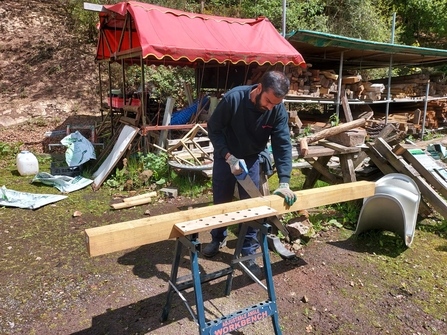
Birmingham & Black Country Wildlife Trust
Before embarking on the Natural Prospects traineeship, I was very close to giving up on pursuing a career in conservation. I had the academic qualifications and had done some volunteering but my experience was still lacking for many potential employers. My friend had faced the exact same issues as me and was lucky enough to get on to secure Natural Prospects traineeship the year before me, which set him up nicely. I decided to do the same and applied for the traineeship role.
The traineeship program had the right blend of education, engagement and conservation aspects so as to make me a well-rounded professional at the end. Having studied conservation at university, I was particularly keen on all the modules involving elements of conservation and education, such as habitat management and working with children. In addition to this, the program helped me to work on my weaknesses, such as construction skills. I was able to improve on these with bridge construction and post and rail fencing that I could take part in during the course of the traineeship.
In July we had a team-building week at the Lickeys and this brought all the natural prospects trainees together for a week of activities ranging from bridge construction and working with volunteers to assessing trees. Working together with fellow trainees to complete tasks helped us to form relationships that will hopefully carry on into the future. I found the team of rangers and my line manager to be incredibly supportive of me during my time, which allowed me to get the most from my traineeship experience.
When I reached the halfway point of my placement at the Lickeys, I began searching for jobs to get an idea of what was out there. I applied for a role with the Community Environmental Trust in October to work as a community engagement and conservation officer. I was successful in securing this position and started my role with them in November, this is proof that the traineeship was a massive success in giving me the skills and confidence to find full-time employment in the sector and I would encourage others to seriously consider applying for the program too.

